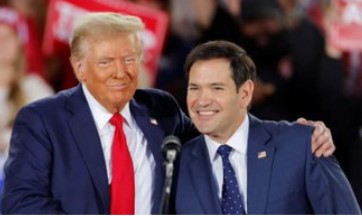
(Photo : x.com)
Trump's Diplomatic Shift: Rubio for Secretary of State
- President-elect Donald Trump is expected to nominate Senator Marco Rubio as Secretary of State, making him the first Latino in this role.
- Rubio's hawkish foreign policy stance has recently aligned more with Trump's restrained approach.
- Rubio's selection signifies a shift in Republican foreign policy and could consolidate Trump's electoral gains among Latinos.
- Despite potential skepticism from Trump's supporters, Rubio's appointment could lead to a greater focus on Latin America in U.S. foreign policy.
In a historic move, President-elect Donald Trump is expected to nominate U.S. Senator Marco Rubio as his Secretary of State, according to multiple sources. This decision would make Rubio, a Florida-born politician, the first Latino to serve as America's top diplomat. The news comes as Trump prepares to take office in January, marking a significant shift in the administration's foreign policy approach.
Rubio, known for his hawkish stance on foreign policy, has been a vocal advocate for a robust approach towards America's geopolitical adversaries, including China, Iran, and Cuba. However, in recent years, he has moderated some of his positions to align more closely with Trump's views. Trump has been critical of past U.S. presidents for leading the country into costly and futile wars and has advocated for a more restrained foreign policy.
Despite Trump's unpredictable nature, sources indicate that he had settled on Rubio for the position as of Monday. However, representatives for both Trump and Rubio did not immediately respond to requests for comment.
Rubio's Role in the New Administration
The new administration will face a world more volatile and dangerous than when Trump first took office in 2017. Wars continue to rage in Ukraine and the Middle East, and China has aligned itself more closely with U.S. foes Russia and Iran. The Ukraine crisis, in particular, will be high on Rubio's agenda.
Rubio, 53, has recently suggested that Ukraine should seek a negotiated settlement with Russia rather than focusing on regaining all territory that Russia has taken in the last decade. He was also one of 15 Republican senators to vote against a $95 billion military aid package for Ukraine, passed in April.
Rubio's likely selection underlines a broad shift in Republican foreign policy views under Trump. Once a party of hawks advocating military intervention and a robust foreign policy, most of Trump's allies now preach restraint, particularly in Europe, where many Republicans complain U.S. allies are not paying their fair share on defense.
Domestic and International Significance of Rubio's Selection
Rubio's selection also holds domestic significance. Trump's victory over Democratic Vice President Kamala Harris in the Nov. 5 election was partly due to winning over large numbers of Latinos, a demographic that has traditionally voted overwhelmingly for Democrats but has become increasingly diverse politically, with more Latinos voting Republican. By selecting Rubio for a key policy role, Trump may help consolidate electoral gains among Latinos and signal that they have a place at the highest levels of his administration.
Rubio's appointment could also signal a greater focus on Latin America than any previous secretary of state, according to Mauricio Claver-Carone, a Rubio ally and former president of the Inter-American Development Bank. This is the time Latin America will most be on the map in the history of any U.S. presidency. It's historic. There's no other way to say it, said Claver-Carone.
Rubio was one of three final contenders for Trump's vice-presidential pick. The president-elect ultimately chose U.S. Senator JD Vance of Ohio, a hard-right figure known for his isolationist foreign policy positions. Some of Trump's supporters may be skeptical of his decision to tap Rubio, who until recently held muscular foreign policy positions that contradict those of Trump.









